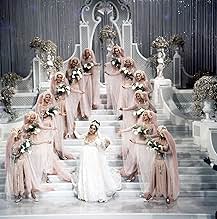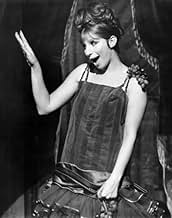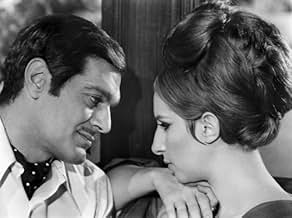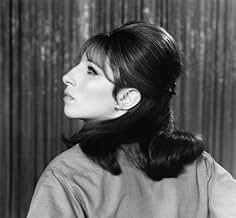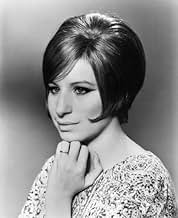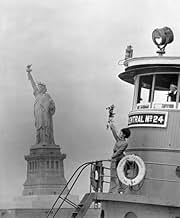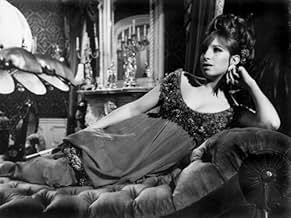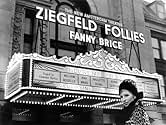Funny Girl
- 1968
- Tous publics
- 2h 31m
IMDb RATING
7.4/10
27K
YOUR RATING
The life of Fanny Brice, famed comedienne and entertainer of the early 1900s: her rise to fame as a Ziegfeld Girl, her subsequent career, and her personal life, particularly her relationship... Read allThe life of Fanny Brice, famed comedienne and entertainer of the early 1900s: her rise to fame as a Ziegfeld Girl, her subsequent career, and her personal life, particularly her relationship with Nick Arnstein.The life of Fanny Brice, famed comedienne and entertainer of the early 1900s: her rise to fame as a Ziegfeld Girl, her subsequent career, and her personal life, particularly her relationship with Nick Arnstein.
- Won 1 Oscar
- 8 wins & 16 nominations total
Karen Stride
- Ziegfeld Girl
- (as Karen Lee)
Featured reviews
Wow, was Barbra ever great in this one! The delivery of the songs, in which she often gets so intoxicated with the great music and lyrics that she starts swaying. The acting, which certainly is none too bad, either. The sheer beauty of her performance is indescribable. Really, I am not exaggerating. She is radiant in just about every frame of the film that she appears in; she practically glows! She is gorgeous, she really is! You cannot help but love this kid from the moment she steps onto the screen. She is funny, she is touching, she is electric, she is wonderful, and she is so many other things.
Omar Sharif certainly is suave as her leading man (And you know exactly how he feels, because you love her, too!), and Kay Medford is also good as her mother. William Wyler's direction is right on the money. And those costumes and sets! But, of course, the film belongs to Barbra. It may drag quite a bit near the end, but she pulls it through. This was her first film, before the egomania, (evident in only her second film, Hello, Dolly!), before the sappy stuff. This was made when she was a fresh young talent who had "so much to offer." And boy, did she deliver the goods in this one! If you see this, you can certainly consider yourself one of the luckiest people in the world.
Omar Sharif certainly is suave as her leading man (And you know exactly how he feels, because you love her, too!), and Kay Medford is also good as her mother. William Wyler's direction is right on the money. And those costumes and sets! But, of course, the film belongs to Barbra. It may drag quite a bit near the end, but she pulls it through. This was her first film, before the egomania, (evident in only her second film, Hello, Dolly!), before the sappy stuff. This was made when she was a fresh young talent who had "so much to offer." And boy, did she deliver the goods in this one! If you see this, you can certainly consider yourself one of the luckiest people in the world.
Quite simply, Barbra Streisand's extraordinary, scintillating Oscar-winning debut in this classic is one of the finest musical-comedy performances ever committed to celluloid. Better than that...I'd venture to say that alongside Vivien Leigh's masterful performance in "Gone With The Wind," Barbra's portrayal of vaudeville icon Fanny Brice may be one of the most ambitious, captivating turns by a lead actress ever captured on film. Even Barbra-phobes would have to concede that the woman completely knocked herself out with "Funny Girl" and her renditions of "I'm The Greatest Star," "My Man," "People" and especially the pulse-jolting "Don't Rain On My Parade" rank right up there with the best of Judy Garland ("Over The Rainbow," "The Trolley Song" and "The Man That Got Away."). Because Streisand has been an exalted Hollywood legend for many decades, people tend to almost take her remarkable talents - both as an actress and as a singer - for granted now but this opulent musical, sparkling score and her thrilling, take-no-prisoners performance will endure as a testament to what pure show business, high octane theatricality and legitimate talent are all about. Sing Proud, Barbra!
I've seen this film many times,and I've always thought it was one of Barbra Streisand's best films because it allowed her to use her strengths as a comedian, singer, and dramatic actor. It's clear that her presence dominates the movie; however, there are some excellent supporting players, including Kay Medford as Fanny Brice's mother Rose and Walter Pigeon as Florenz Ziegfeld, two very fine character actors. Rose is particularly likable because, unlike her daughter Fanny, she sees things as they are and not the way they should be. This applies to her comment about Nick Arnstein, the handsome gambler that Fanny marries, despite the fact that Rose perceives him to be a "sponge."
Fanny, as shown in this film, is also very likable not only because of her humor but for her generosity and thoughtfulness. Her ambition, of course, is to conquer the stage and she does so fairly quickly after making a great mess of a roller skate number at the local dance hall. Before long, Fanny is auditioning for Ziegfeld, the famous impressario and she wins him over with her talent and charm. Nick Arnstein, a man about town, always seems to be around Fanny when she triumphs on the stage and this time is no different. He buys her a beautiful bouquet of roses with a note, "Dear Star, I told you so." Very soon, Fanny and Nick become involved in a relationship which is often on and off until Fanny literally proposes to him. What follows is a heartbreaking story of a young woman whose desire to be loved for herself alone and her passion for a happy domestic life is thwarted by fate and some wrong choices.
After a montage of the first year of their marriage together, problems start affecting the Arnstein marriage. It is true that they are wealthy people; however, their problems aren't minor. Nick begins to lose heavily at the gaming table and everything he tries ends in failure. Fanny, on the other hand, continues to be successful on the stage and Nick starts to resent her. Suddenly, all of his gentlemanly charm and good manners disappear as if by magic; he's rude to Fanny, making her upset over things that a truly married couple would find a way to resolve. Indeed, he starts ignoring her deliberately and places his interests and needs above hers. After a while, the marriage collapses not because of Fanny's career but the way in which Nick looks at their relationship (we discover this near the end of the film.) He also conceals his financial problems from her, shutting Fanny out of his life as though she didn't exist.
All of this culminates in Nick's unfortunate involvement in a shady bond scheme which sends him to prison for two years. I would say that these problems are rather huge. I don't want to give more away because I feel others should have the opportunity to see the film and judge for themselves. But I have to say that the ending of the movie, is, in my opinion, one of the most heartfelt, dignified, and classiest moments ever put on film. And Barbra Streisand makes the most of it, touching us not only with her excellent performance of the song "My Man" but also by the way her Fanny carries herself, taking responsibility for her choice and showing that she will go on with her life, despite what's happened to her.
Fanny, as shown in this film, is also very likable not only because of her humor but for her generosity and thoughtfulness. Her ambition, of course, is to conquer the stage and she does so fairly quickly after making a great mess of a roller skate number at the local dance hall. Before long, Fanny is auditioning for Ziegfeld, the famous impressario and she wins him over with her talent and charm. Nick Arnstein, a man about town, always seems to be around Fanny when she triumphs on the stage and this time is no different. He buys her a beautiful bouquet of roses with a note, "Dear Star, I told you so." Very soon, Fanny and Nick become involved in a relationship which is often on and off until Fanny literally proposes to him. What follows is a heartbreaking story of a young woman whose desire to be loved for herself alone and her passion for a happy domestic life is thwarted by fate and some wrong choices.
After a montage of the first year of their marriage together, problems start affecting the Arnstein marriage. It is true that they are wealthy people; however, their problems aren't minor. Nick begins to lose heavily at the gaming table and everything he tries ends in failure. Fanny, on the other hand, continues to be successful on the stage and Nick starts to resent her. Suddenly, all of his gentlemanly charm and good manners disappear as if by magic; he's rude to Fanny, making her upset over things that a truly married couple would find a way to resolve. Indeed, he starts ignoring her deliberately and places his interests and needs above hers. After a while, the marriage collapses not because of Fanny's career but the way in which Nick looks at their relationship (we discover this near the end of the film.) He also conceals his financial problems from her, shutting Fanny out of his life as though she didn't exist.
All of this culminates in Nick's unfortunate involvement in a shady bond scheme which sends him to prison for two years. I would say that these problems are rather huge. I don't want to give more away because I feel others should have the opportunity to see the film and judge for themselves. But I have to say that the ending of the movie, is, in my opinion, one of the most heartfelt, dignified, and classiest moments ever put on film. And Barbra Streisand makes the most of it, touching us not only with her excellent performance of the song "My Man" but also by the way her Fanny carries herself, taking responsibility for her choice and showing that she will go on with her life, despite what's happened to her.
Every time a film is made about a real-life figure, particularly a show business figure, people love to complain that the movie is not accurate regarding the facts of that person's life. If the truth be told, if movie biographies were strictly about the facts, no one would go to see them, because for the most part, the facts don't make for great entertainment and Fanny Brice is no exception. The 1968 musical FUNNY GIRL has been maligned for years because it is not a very accurate representation of the facts of Fanny Brice's life. If you want to learn about Fanny Brice's life, read a biography or go on the internet, but if you want to see an amazing movie musical spotlighting a legendary performer at the beginning of her amazing career, then you can't beat FUNNY GIRL, the 1968 musical based on the 1964 Broadway musical that made Barbra Streisand a star. Streisand tied with Katharine Hepburn for the Best Actress Oscar for this charismatic star turn as the young girl from Henry Street who becomes a big star of the Ziegfeld Follies and has a heartbreaking romance with a charming gambler named Nick Arnstein, played by Omar Sharif. Streisand is in practically every frame of this film and never makes you wish otherwise...one of the great performances in the history of cinema...whether she is defying Florenz Ziegfeld by refusing to appear in the finale or chasing an ocean liner to be with Nick, Streisand gives the one-woman performance of a lifetime here. Directed by Oscar-winner William Wyler, Streisand is lovingly photographed and effectively showcases the Jule Styne-Bob Merrill score, which includes classics like "People" and "Don't Rain On My Parade". Some changes have been made in the score from the stage musical but Streisand makes it all work and the finale "My Man" is just devastating. It's not an accurate biography of the vaudeville legend, but as a dazzling and entertaining movie musical, it's hard to top this one.
Tour-de-force for Barbra Streisand, reprising her Broadway triumph and taking over the screen as 1930s Ziegfeld singer/comedienne Fanny Brice. Streisand's incredible self-assurance and clowning poise was enough to win her the Best Actress Oscar AND tick off most of Hollywood (few in the business were prepared for someone like Streisand in 1968, except maybe those familiar with her TV work, but the results here show she didn't care what anyone thought of her). The sets look phony, the script is contrived, and Omar Sharif is somewhat miscast as husband Nick Arnstein (Sharif is wonderful in the early stages, but his wet, red eyes and mincing baby-talk grow incredibly weary); however most of the song numbers are fabulous, and Barbra is at her best when delivering a high-powered number. She's tough and unyielding even while doing a comedic bit, but during an emotional song she lets her guard drop a little (not enough to become truly vulnerable, just enough to let us share her pain). The film doesn't exhaust one the way some musical extravaganzas can; the camera-work is uneven and some sequences are overlit, but it has lots of spirit and dazzle. Most importantly, it's a film that remembers it is about a woman and a man, and never allows the show-biz glitter to suffocate the characters. *** from ****
Did you know
- TriviaWilliam Wyler was asked by a friend whether Barbra Streisand had been hard to work with. He replied, "No, not too hard, considering it was the first movie she ever directed."
- GoofsAfter Nick's release from prison in 1927, he and Fanny did not sadly but amicably part. Instead, Nick rewarded Fanny's years of support by almost immediately starting a series of affairs. Fanny demanded he give her grounds for divorce and even had their children's last name legally changed to Brice. Although he and Fanny would meet again several years later, he never attempted to see his children again.
- Quotes
Fannie Brice: I'm a bagel on a plate full of onion rolls!
- Alternate versionsThe original theatrical version included an additional overture before the opening credits, an intermission after "Don't Rain On My Parade," and exit music after the end credits. These additional music pieces have been restored for the DVD release.
- ConnectionsFeatured in This Is Streisand (1968)
- How long is Funny Girl?Powered by Alexa
Details
- Release date
- Country of origin
- Language
- Also known as
- Funny Girl: Chica rara
- Filming locations
- Jersey Central Railway Station, Jersey City, New Jersey, USA('Don't Rain On My Parade' sequence)
- Production companies
- See more company credits at IMDbPro
Box office
- Budget
- $14,100,000 (estimated)
- Gross US & Canada
- $52,223,306
- Opening weekend US & Canada
- $65,560
- Sep 3, 2001
- Gross worldwide
- $52,225,786
- Runtime
- 2h 31m(151 min)
- Color
- Aspect ratio
- 2.35 : 1
Contribute to this page
Suggest an edit or add missing content




